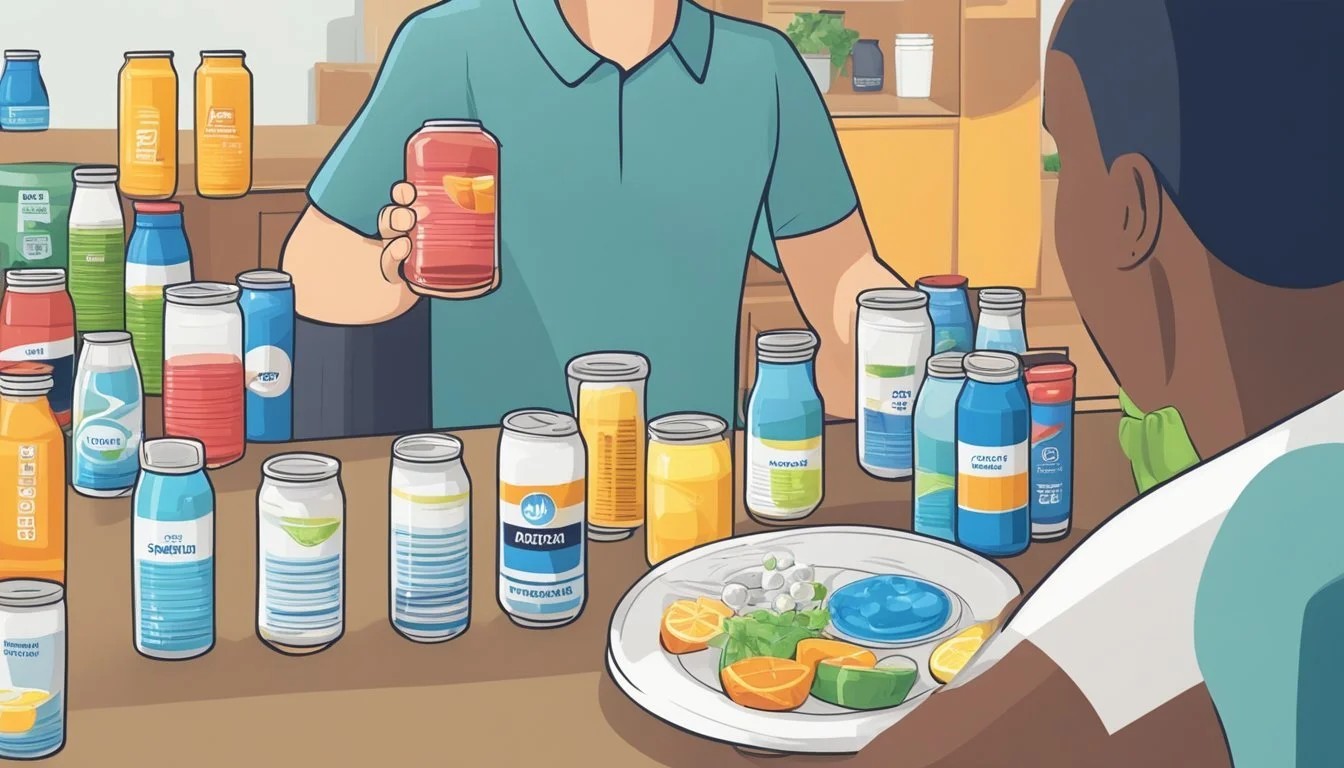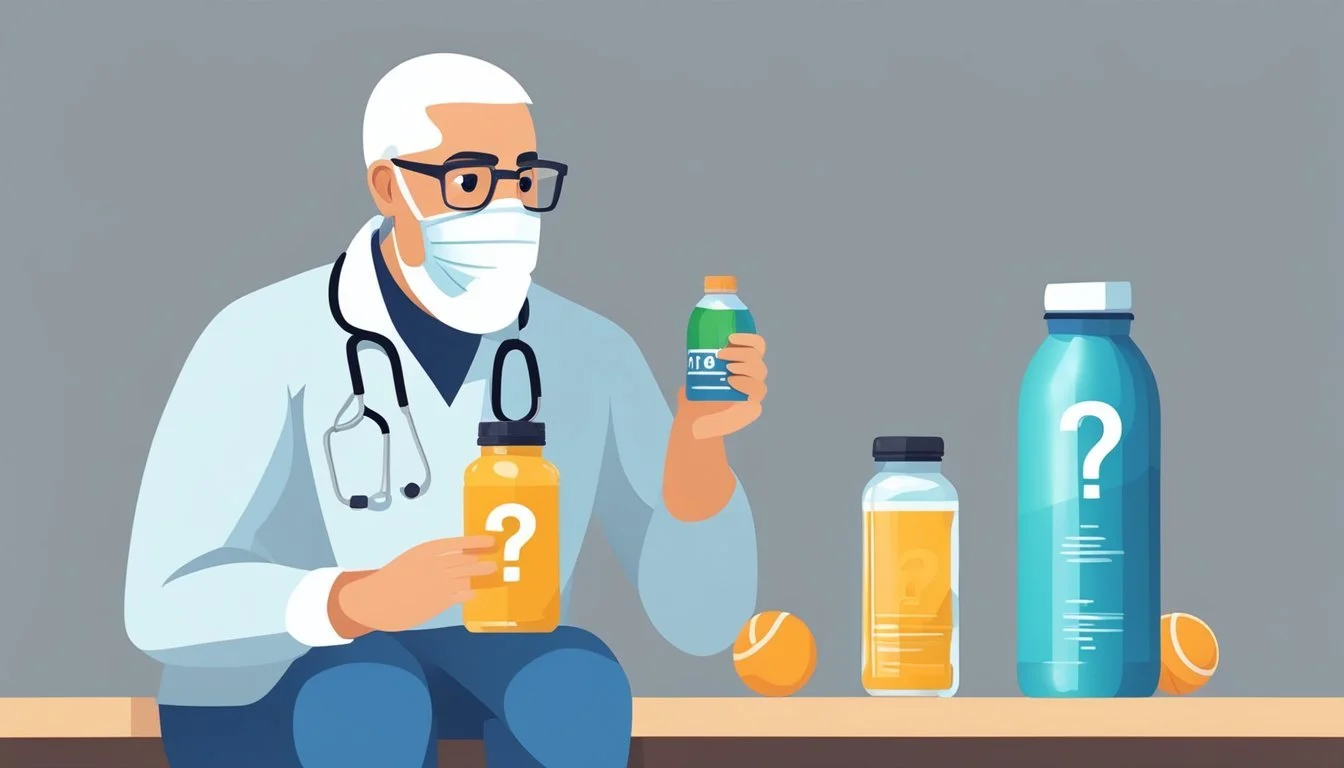Can Diabetics Eat Sports Drinks?
Essential Guidelines and Considerations
Sports drinks are popular among athletes for their hydrating and energy-boosting properties, but their impact on individuals with diabetes can be a bit more complicated. While these beverages can provide quick hydration and energy, those with diabetes need to be cautious due to the potential for high sugar content, which can spike blood glucose levels. Many sports drinks also contain caffeine, which can trigger the release of stored sugar from the liver, further affecting blood glucose control.
For diabetics, choosing the right sports drink is essential. Some options on the market are formulated to have lower sugar content and may include additional ingredients that help manage hydration without causing significant blood sugar spikes. Coconut water is one example that offers hydration benefits with less sugar compared to typical sports drinks, making it a more suitable choice for people with diabetes.
Engaging in physical activity while managing diabetes requires careful planning, and knowing what to consume before, during, and after exercise can make all the difference. Proper hydration is critical, and sports drinks can play a role if chosen wisely. Speaking with a healthcare professional can help tailor recommendations to individual needs and preferences.
Understanding Diabetes and Blood Sugar Management
Managing diabetes involves controlling blood sugar levels. Key aspects include the role of insulin, understanding different types of diabetes, and how to monitor blood sugar levels effectively.
The Role of Insulin in Blood Glucose Control
Insulin, a hormone produced by the pancreas, plays a crucial role in regulating blood glucose levels. It allows glucose to enter cells, providing them with energy. When insulin is lacking or not used effectively, glucose remains in the bloodstream, leading to high blood sugar.
In people with type 1 diabetes, the body produces little to no insulin. They must rely on insulin therapy. For those with type 2 diabetes, the body does not use insulin efficiently, often requiring lifestyle changes, medications, or insulin therapy.
Types of Diabetes
Type 1 Diabetes: This autoimmune condition occurs when the body attacks insulin-producing cells in the pancreas. It's usually diagnosed in children and young adults. Daily insulin injections or an insulin pump are necessary for managing this type.
Type 2 Diabetes: This form of diabetes is more common and often associated with obesity and physical inactivity. The body becomes resistant to insulin or doesn't produce enough. Management includes lifestyle changes, oral medications, and sometimes insulin.
Gestational Diabetes: This type occurs during pregnancy and usually resolves after childbirth. However, it increases the risk of developing type 2 diabetes later in life.
Monitoring Blood Sugar Levels
Regular monitoring is essential for effective diabetes management. Blood glucose levels should be checked using a glucose monitor. The frequency depends on the type of diabetes and the treatment plan.
Continuous Glucose Monitors (CGMs): These devices provide real-time blood sugar readings and trends over time, assisting in better glucose management.
Fingerstick Tests: These are traditional methods where a drop of blood is placed on a test strip and read by a glucose meter. It’s beneficial for daily monitoring and adjusting treatment as needed.
Keeping track of blood sugar levels helps in making informed decisions about diet, exercise, and medications. It also assists in preventing complications such as hypoglycemia and hyperglycemia.
Hydration and Diabetes
Hydration is crucial for managing diabetes. Proper fluid intake helps maintain blood sugar levels and supports kidney function, which are vital for people with diabetes.
Importance of Staying Hydrated
Keeping the body well-hydrated is essential for overall health, and especially for individuals with diabetes. Water is the best choice for hydration. It helps dilute the blood, which can lower blood sugar levels. In addition to water, options like infused water with slices of fruits or vegetables can add flavor without adding sugar.
Benefits of Staying Hydrated:
Regulates Blood Sugar: Adequate fluid intake helps keep blood sugar levels stable.
Supports Kidney Function: Proper hydration aids in flushing out excess glucose through urine.
Dehydration can exacerbate diabetes complications, so maintaining fluid balance is critical. Coconut water can be a good alternative as it contains natural sugars and electrolytes.
Effects of Dehydration on Blood Sugar
Dehydration can cause blood sugar levels to rise. When the body becomes dehydrated, the kidneys retain more water, decreasing their ability to flush out excess glucose. This retention can lead to higher blood sugar levels. Additionally, the body's response to dehydration often involves releasing stress hormones, which can also increase blood glucose.
Signs of dehydration in diabetics can include intense thirst, dry mouth, and dark urine. Monitoring these signs and maintaining fluid intake helps prevent spikes in blood sugar. Managing hydration involves not just drinking water but also consuming hydrating foods like fruits and vegetables with high water content.
Nutritional Content of Sports Drinks
Understanding the nutritional content of sports drinks is key for diabetics. Important aspects include their sugar and carbohydrate levels, as well as the electrolytes they contain, which play vital roles in hydration and bodily functions.
Sugar and Carbohydrate Content
Sports drinks often contain significant amounts of sugar and carbohydrates. Popular brands like Gatorade and Powerade have about 25 grams of carbohydrates per 12-ounce serving, primarily from added sugar.
For diabetics, this sugar content can impact blood glucose levels. A 6% carbohydrate concentration typically denotes the ratio of sugar to water in these drinks, which needs careful consideration for those managing their blood sugar.
Alternatives with lower sugar content, such as Nooma Organic Sports Drink, offer options with only 5 grams of naturally occurring sugar from coconut water. Diabetics should check labels for added sugars and total carbohydrates to make informed choices that align with their dietary needs.
Electrolytes and Their Functions
Electrolytes such as sodium and potassium are critical components of sports drinks. They help maintain fluid balance, muscle function, and overall hydration. Sodium, found in significant quantities in sports drinks, aids in retaining water in the body, which is crucial during intense exercise or illness.
Potassium supports heart function and muscle contractions, making it another essential electrolyte in these beverages. Sports drinks with balanced electrolyte content are beneficial during periods of heavy sweating or dehydration.
Diabetics should select drinks that provide necessary electrolytes without excessive calories or sugar to maintain optimal health while staying hydrated. They can consult healthcare providers for personalized advice.
Impact of Sports Drinks on Diabetics
Impact of sports drinks on diabetics mostly involves their effect on blood sugar levels and associated risks of weight management and obesity. Understanding these factors helps in making informed choices regarding the consumption of sports drinks.
Blood Sugar Levels and Glycemic Index
Sports drinks can significantly impact the blood sugar levels of individuals with diabetes. Many sports drinks, such as Gatorade and Powerade, contain high levels of sugar and carbohydrates, which can quickly raise blood glucose levels. For instance, these drinks typically contain around 25 grams of carbohydrates per 12 ounces.
The glycemic index (GI) of these drinks is also critical to consider. High-GI foods and drinks cause rapid spikes in blood sugar. People with diabetes should be cautious about these spikes as they can lead to complications. Some sports drinks contain caffeine, which can further increase blood glucose by stimulating the release of glucose from the liver.
Weight Management and Obesity Risks
Another concern involves weight management and the risk of developing obesity. Regular consumption of high-calorie sports drinks can contribute to weight gain. A typical bottle of Gatorade or Powerade has about 140 calories per 20 ounces, containing 34 grams of added sugar.
This calorie surplus, when not balanced with physical activity, can lead to weight gain. Obesity is a significant risk factor for worsening diabetes. Thus, diabetics need to carefully consider the calorie and sugar content in sports drinks.
Choosing low-sugar options or alternatives, such as Nooma Organic Sports Drink which contains fewer calories and sugars, can be a more suitable choice for hydration without the added risks.
Alternatives to Sports Drinks
For people with diabetes, conventional sports drinks can often be high in sugar. There are many healthier alternatives that can help maintain hydration and avoid spikes in blood sugar levels.
Healthy Hydration Options
Water is the best and simplest hydration option. It's calorie-free and won't affect blood sugar levels. Adding a slice of lemon or cucumber can enhance its flavor without adding sugar.
Unsweetened tea and coffee are also good alternatives. Herbal teas like chamomile or peppermint offer flavor variety without added sugars. For coffee lovers, sticking to plain black coffee or an Americano can keep blood sugar stable.
Milk provides a source of hydration and essential nutrients like calcium and vitamin D. Opt for unsweetened or low-fat varieties to manage sugar intake.
Coconut water is a natural option with fewer sugars than most fruit juices. It's rich in electrolytes like potassium, making it a suitable choice for rehydration.
Vegetable juices like tomato or carrot juice are low in natural sugars compared to fruit juices and provide essential vitamins and minerals. Choose 100% vegetable juices with no added sugars.
Making Informed Choices with Beverages
Reading labels is crucial when selecting hydration drinks. Look for drinks with no added sugars and low carbohydrate content.
Avoid fruit juices with added sugars. If consuming fruit juice, opt for 100% juice and limit portions to manage carbohydrate intake.
Nooma Organic Sports Drink is a notable example of a low-sugar hydration drink. Made from organic coconut water and electrolytes, it provides hydration without excessive sugar.
Homemade drinks like infused water with fruits or herbs can be customized to individual taste preferences without added sugars.
Being mindful of serving sizes and ingredient lists ensures that chosen beverages support overall health and blood sugar management.
Exercise, Diabetes, and Hydration
Ensuring proper hydration and monitoring carbohydrate intake is vital for athletes with diabetes to maintain optimal performance and health. The right approach can help manage blood sugar levels during and after physical activity.
Managing Hydration During Physical Activity
Hydration is crucial for everyone, but it's especially vital for diabetics during exercise.
Dehydration can lead to elevated blood glucose levels, making it essential to drink fluids regularly. Water is always a good choice, but on hot days or during intense exercise, sports drinks can help replenish electrolytes.
However, many sports drinks contain sugars that can impact blood glucose levels. Checking the carbohydrate content of the drink and choosing lower-sugar options, like coconut water, can be beneficial.
List of Hydration Options:
Water: No carbs, best for routine hydration.
Coconut Water: Low sugar, natural electrolytes.
Sports Drinks: Check labels for sugar content; use with caution.
Counting Carbs and Sugar Intake for Diabetic Athletes
Carbohydrate intake must be carefully monitored for diabetic athletes. Most sports drinks contain around 25 grams of carbs per 12 ounces, which can impact blood sugar.
Before consuming these drinks, it’s important to factor them into the daily carb count.
For those engaged in intense exercise, the extra carbs may be useful for energy. However, it’s essential to consult with a healthcare provider to find the right balance. Using carb-free or low-carb drinks is another strategy to manage carbohydrate intake effectively.
Tips for Counting Carbs:
Read Labels: Always check the nutrition facts.
Use Alternatives: Opt for drinks with lower or no sugar.
Consult Professionals: Get advice tailored to individual needs.
Potential Health Risks and Complications
Consuming sports drinks while managing diabetes can present several serious health risks. This section covers the potential acute and long-term complications that can arise.
Understanding Diabetic Ketoacidosis (DKA)
Diabetic Ketoacidosis (DKA) is a severe condition where the body produces excess ketones due to insulin deficiency. High sugar content in sports drinks can accelerate this process, especially if insulin levels are not properly managed. Elevated ketones can lead to dehydration, confusion, and if left untreated, coma or death. It's essential to monitor blood sugar and ketone levels frequently when consuming sports drinks.
Long-Term Health Complications of Diabetes
Over time, poor blood sugar management can lead to various long-term complications. The high carbohydrate content in sports drinks can contribute to consistent high blood sugar levels.
Heart Disease & Stroke: Consistently elevated glucose can damage blood vessels, increasing the risk of heart disease and stroke.
Kidney Disease: High blood sugar levels can strain the kidneys, leading to nephropathy.
Eye Disease: Diabetics are at risk of diabetic retinopathy, which can lead to blindness.
Nerve Damage: Neuropathy is a common complication, resulting in pain and numbness in extremities.
These complications highlight the importance of careful dietary choices and regular monitoring of blood sugar levels for people with diabetes.
Recommendations for Diabetics Considering Sports Drinks
When considering sports drinks, it’s crucial for diabetics to focus on managing blood glucose levels while staying hydrated. These drinks often contain high levels of sugar, so careful selection and moderation are key.
Label Reading and Avoiding Hidden Sugars
For diabetics, reading labels on sports drinks is essential. Many sports drinks contain added sugars, which can spike blood glucose levels. Look for labels that specify the amount of carbohydrates and sugars per serving.
Ingredients such as high fructose corn syrup, sucrose, or glucose should be minimized. Seek out low-sugar or sugar-free options. Some drinks may contain benefits like electrolytes without unnecessary sugars.
It’s also wise to be aware of serving sizes. One bottle could contain multiple servings, multiplying the sugar intake. Consuming drinks with natural sweetness from sources like coconut water can be beneficial without excessive sugar.
Incorporating Sports Drinks into a Diabetic Diet
Integrating sports drinks into a diabetic diet requires balancing them with other nutritional needs. These drinks can aid in hydration and provide energy during physical activities. However, choosing options with minimal added sugars is crucial.
Diabetics should ensure they get enough fiber and protein in their diet, which can help manage insulin resistance. Nooma Organic Sports Drink is an example with lower sugar content, offering electrolytes from natural sources like coconut water.
Consultation with a healthcare professional is important to determine suitable sports drinks and quantities. They can help monitor how these beverages impact blood glucose levels and adjust dietary plans as needed.
Lifestyle Tips for Managing Diabetes
Effective diabetes management involves careful nutrition and diet planning, as well as regular physical activity to help regulate blood sugar levels.
Nutrition and Diet Planning
A balanced diet is crucial for diabetes management. Meal planning should focus on controlling carbohydrate intake. Whole grains, vegetables, and lean proteins play significant roles.
Avoiding high-sugar foods can prevent blood sugar spikes. Monitoring portions can further assist in keeping blood glucose levels stable.
Some key principles include:
Consuming a variety of nutrient-rich foods.
Including fiber-loaded foods such as beans and legumes.
Limiting intake of saturated fats and sodium.
Hydration is also essential. Diabetics should choose water or low-calorie beverages to stay hydrated without affecting their glucose levels.
Physical Activity and Consistent Exercise
Regular exercise aids in managing diabetes by enhancing insulin sensitivity and maintaining ideal body weight. Activities such as walking, swimming, or cycling can effectively control blood glucose levels.
Consistent physical activity can:
Lower blood sugar by enhancing insulin efficiency.
Boost cardiovascular health and overall energy levels.
Aim for at least 150 minutes of moderate-intensity exercise weekly. Including both aerobic exercises and resistance training, like weightlifting, is beneficial.
Staying active also improves mental well-being, which can positively impact diabetic health.








